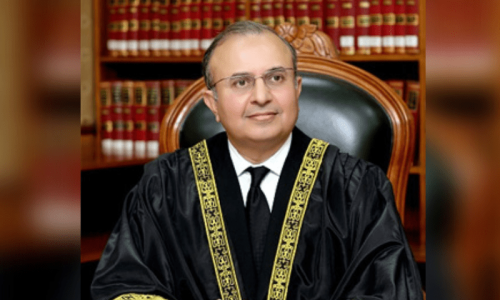ISLAMABAD: Senior puisne judge of the Supreme Court Justice Mansoor Ali Shah has called on the Judicial Commission of Pakistan (JCP) to urgently finalise ‘clear and transparent rules’ for appointing judges to constitutional courts, warning that any appointments without such a framework would be unconstitutional and could undermine judiciary’s independence.
In a detailed letter to Justice Jamal Khan Mandokhail, the chairman of the JCP’s rule-making committee, Justice Shah underscored the constitutional obligation under Article 175A(4), which requires the JCP to establish procedures and criteria for assessing and appointing judges. He expressed deep concern that the absence of these rules jeopardises the rule of law, democracy, and public confidence in the judiciary.
Justice Shah highlighted the risks posed by the 26th Amendment that allows the executive to a have a majority of members within the JCP, warning that this shift could lead to politically motivated appointments and undermine the ideological commitment of judges to the rule of law.
In letter to JCP’s rule-making committee, senior puisne judge warns absence of robust rules could allow external influences to undermine judiciary
“This unprecedented change disturbs the delicate balance of power and risks politicising the judiciary, eroding its independence,” he noted.
Proposed framework
He proposed a comprehensive set of criteria to ensure merit-based and transparent selections including integrity and ethical standards; judicial efficiency; and diversity. Candidates must demonstrate personal and professional integrity, honesty, and impartiality as well as proven ability to handle complex cases and deliver timely judgements. Equally important is gender, ethnic, and professional diversity to enhance judicial deliberations and public trust, according to him.
The senior puisne judge also suggested a structured application process, panel interviews, peer reviews, and continuous performance oversight for judges’ post-appointment.
He urged the JCP to finalise these rules before proceeding with any appointments, cautioning that a rushed or opaque process would weaken the judiciary for years to come. “The absence of robust rules will allow external influences to undermine the judiciary, risking appointments that serve partisan interests rather than constitutional values,” he wrote.
As the next JCP meeting is scheduled for Dec 21, Justice Shah highlighted the importance of adopting draft rules by then to ensure transparency and fairness in future appointments.
Justice Shah concluded by stressing that a strong, independent judiciary is critical for upholding democracy and public trust. His appeal underscores the urgent need for reforms to safeguard judicial independence and maintain the judiciary’s role as a neutral arbiter of justice.
Earlier on Dec 4, a day before the JCP meeting was to consider appointment of additional judges to Sindh and Peshawar high courts, Justice Shah had suggested that the session be postponed until challenges to the 26th Amendment are determined.
In a three-page letter, Justice Shah requested Chief Justice Yahya Afridi to postpone the JCP meeting and convene instead a full court to fix pending challenges to the 26th Amendment for hearing. Justice Shah also suggested the JCP make rules of its procedure under Article 175A(4).
However, during the JCP meeting, Justice Afridi reportedly explained that he had already addressed Justice Shah’s suggestions.
Chief Justice Afridi emphasised that cases filed under Article 184(3) or those requiring constitutional interpretation must be heard by a constitutional bench. He insisted he had no role in the matter and that it was up to the committee to decide when to take up the issue. Moreover, it was beyond the scope of the JCP to discuss anything about the 26th amendment, he pointed out.
At the previous session, the JCP also prioritised drafting procedural rules, authorising the CJP to appoint members to a committee for this purpose.
Justice Jamal Khan Mandokhail was made the chairman of the rule-making committee, with Attorney General for Pakistan Mansoor Usman Awan, senators Barrister Syed Ali Zafar and Farooq H. Naek and senior counsel Akhtar Hussain serving as members.
The committee aims to present draft rules by Dec 15.
Published in Dawn, December 14th, 2024













































